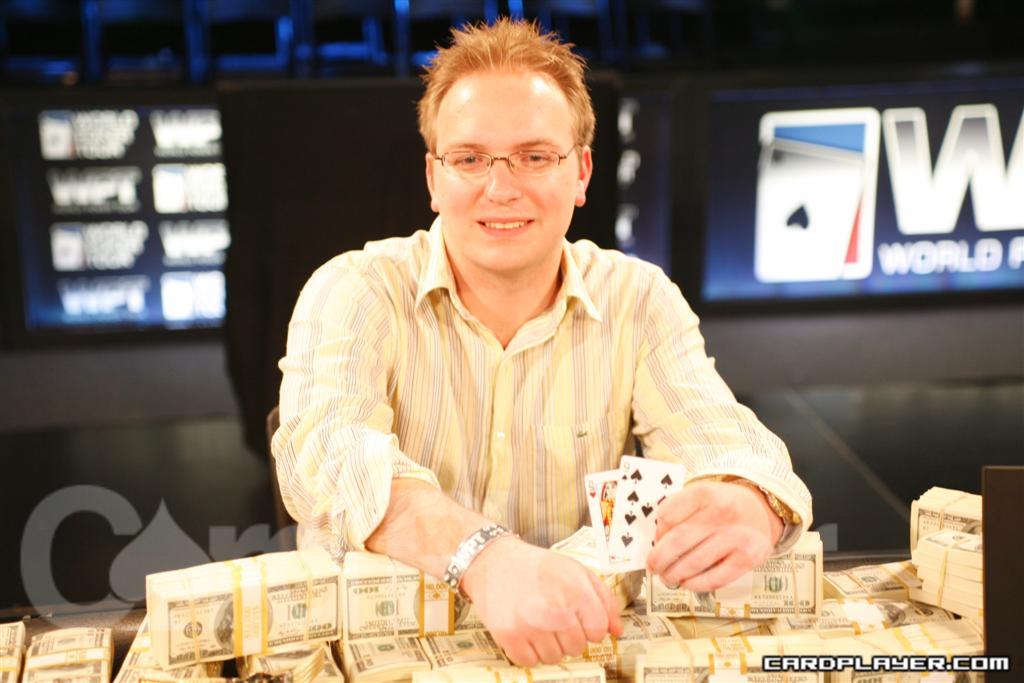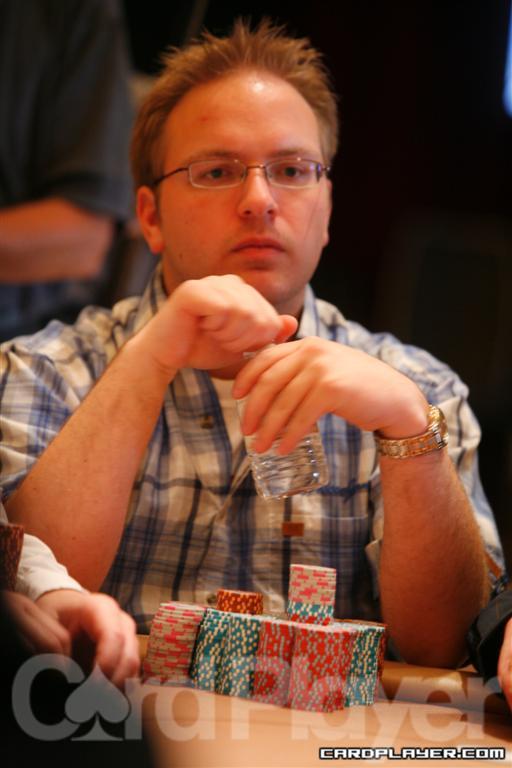 Every Thursday, Card Player sits down with some of the best in the game to discuss pivotal hands from the week’s biggest tournaments on the circuit.
Every Thursday, Card Player sits down with some of the best in the game to discuss pivotal hands from the week’s biggest tournaments on the circuit.
This week, we spoke with Mike Watson, winner of the 2008 Bellagio Cup IV main event. Watson, who has been playing poker tournaments seriously for the past three years, outlasted a field of 446 en route to a $1,673,300 payday. The online professional, who plays under the name SirWatts, has also earned nearly $300,000 online in 2008 in Card Player’s Online Player of the Year-qualifying events alone. Watson is a model of consistency online, and has more than 25 top-20 finishes this year. All told, the 24-year-old native of Toronto has a combined $2.3 million in lifetime earnings.
The hand in question, much like last week's What's My Line?, was a key determining factor in Watson's rise up the leader board during the Bellagio Cup IV. After his double up, Watson graciously accepted his role as table bully and was able to use his newfound chips to apply pressure and accumulate for the upcoming money bubble. Watson never slowed down, and he went into the final day with the overall chip lead, where he parlayed his position into his first World Poker Tour title.
| Event - Blinds/ Ante |
Bellagio Cup IV |
1,000-2,000 with a 300 ante |
| Player |
Mike Watson |
The Russian in the hijack seat |
| Chip Count |
94,200 |
About 155,000 |
| Hand |
A 9 9 |
8 7 7 |
The player in the hijack seat limped, and Mike Watson raised his button to 7,000 with A 9
9 . The small blind flat-called, and the hijack came along, as well.
. The small blind flat-called, and the hijack came along, as well.
The flop came A 8
8 4
4 , and everyone checked to Watson, who decided to check behind.
, and everyone checked to Watson, who decided to check behind.
The turn was the 2 , and the small blind checked. The cutoff then bet 30,000, a bit more than the size of the pot.
, and the small blind checked. The cutoff then bet 30,000, a bit more than the size of the pot.
Watson took some time before moving all in for a total 87,200. The small blind folded, and the hijack made the call, showing 8 7
7 for middle pair and a flush draw. The river was the 2
for middle pair and a flush draw. The river was the 2 , and Watson doubled up to just under 200,000 in chips.
, and Watson doubled up to just under 200,000 in chips.
The Interview
 Julio Rodriguez: I wanted to talk with you about a hand you played late on day 2, about 50 spots away from the money. In the hand, you defended your button and doubled up.
Julio Rodriguez: I wanted to talk with you about a hand you played late on day 2, about 50 spots away from the money. In the hand, you defended your button and doubled up.
Mike Watson: Sure, the Russian in the hijack limped for 2,000, and I made it 7,000 to go on the button with A-9 offsuit. I really wanted to isolate the guy, because he was playing too many hands, but the small blind called. I figured him for a hand of decent strength to call in that spot, and the hijack called, as well.
I was sitting with about 90,000, the small blind was short-stacked, and the Russian covered me. The flop came A 8
8 4
4 , and they both checked to me. I decided to check behind.
, and they both checked to me. I decided to check behind.
JR: Many players would fire in a bet in that situation after hitting their hand. Why check behind?
MW: I felt that there was a good chance that I wasn’t getting much action from a hand I could beat. Also, I felt that the small blind was strong preflop, so if he called my flop bet, I really wouldn’t know how to proceed on later streets. It’s really a spot where I’m either way ahead, or way behind. There really weren’t any draws out there to protect against, so there’s not much harm in giving a free card.
JR: The 2 comes off on the turn, and the small blind checks. At this point, do you think that the blind has given up on the hand?
comes off on the turn, and the small blind checks. At this point, do you think that the blind has given up on the hand?
MW: Yeah, he’s most likely got a pocket pair that missed the board. But the Russian decides to bone out 30,000 into a 25,000 pot. The whole day he’d been playing pretty passively. He never bet his big hands strong, he was limp-calling frequently, so his big turn bet was pretty out of character.
JR: Forgetting that you eventually saw his cards, what kind of hand are you putting him on?
MW: The first thing that came to my mind was that he was on a big draw. I don’t think he has an ace, almost ever. He would’ve raised it preflop. A set is still unlikely, although I guess he could’ve limped with deuces or fours, but he hadn’t been betting his big hands strongly. A big draw fit his line more than anything.
JR: So, after he studied you for a bit, you decided to come over the top all-in for another 60,000 or so. Are you shoving for value, or are you trying to get him off of the hand?
 MW: Definitely for value, since I was pretty confident that I had the best hand. I counted down my stack, trying to figure out if I played the hand, could I conceivably call on the turn and shove the river? I decided to put it in there, however, figuring that if he had a draw, he wouldn’t pay me off on the river unless he hit. Also, I wouldn’t mind getting my money in as a 2-1 favorite, which ended up being the case.
MW: Definitely for value, since I was pretty confident that I had the best hand. I counted down my stack, trying to figure out if I played the hand, could I conceivably call on the turn and shove the river? I decided to put it in there, however, figuring that if he had a draw, he wouldn’t pay me off on the river unless he hit. Also, I wouldn’t mind getting my money in as a 2-1 favorite, which ended up being the case.
He showed the combo draw and I faded all of his 14 outs when the river paired the board. It was a pretty nice pot at a critical time in the tournament and really allowed me to take control of my next couple tables with my stack.
JR: What would you say to those who defend their button and find themselves in a similar situation?
MW: You don’t always have to bet out there when you hit top pair, especially if you have a weak kicker. Sometimes it’s better to check behind, unless it’s a draw-heavy board and you have to protect your hand. In a tough spot, you can check behind and under-represent your hand and turn it in to a bluff-catcher. On later streets, when your opponents think you’ve missed, you can pick up some crucial pots against aggressive players.








 9
9
 7
7
 9
9 . The small blind flat-called, and the hijack came along, as well.
. The small blind flat-called, and the hijack came along, as well. 8
8 4
4 , and everyone checked to Watson, who decided to check behind.
, and everyone checked to Watson, who decided to check behind. , and the small blind checked. The cutoff then bet 30,000, a bit more than the size of the pot.
, and the small blind checked. The cutoff then bet 30,000, a bit more than the size of the pot. 7
7 for middle pair and a flush draw. The river was the 2
for middle pair and a flush draw. The river was the 2 , and Watson doubled up to just under 200,000 in chips.
, and Watson doubled up to just under 200,000 in chips.
 8
8 4
4 , and they both checked to me. I decided to check behind.
, and they both checked to me. I decided to check behind. comes off on the turn, and the small blind checks. At this point, do you think that the blind has given up on the hand?
comes off on the turn, and the small blind checks. At this point, do you think that the blind has given up on the hand?
